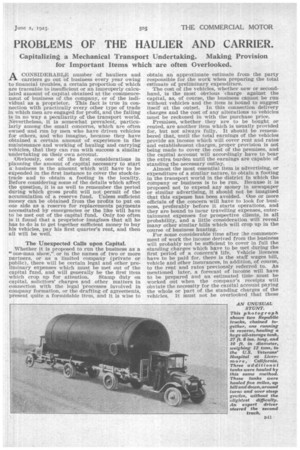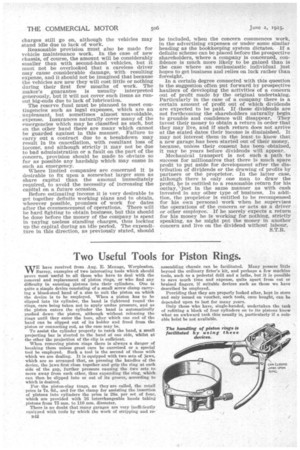PROBLEMS OF THE HAULIER AND CARRIER.
Page 25

Page 26

If you've noticed an error in this article please click here to report it so we can fix it.
Capitalizing a Mechanical Transport Undertaking. Making Provision for Important Items which -are often Overlooked.
ACONSIDERABLE number of hauliers and carriers go out of business every year owing to financial troubles, a certain proportion of which are traceable to insufficient or an improperly calculated amount of capital obtained at the commencement of business of the company, or of the individual as a proprietor. This fact is true in connection with practically every other type of trade in which men are engaged for profit, and the failing is in no way a peculiarity of the transport world. Nevertheless, it is somewhat prevalent, particularly among the small concerns, which are often owned and rim by men who have driven vehicles for others, and who imagine, because they have obtained a certain amount of experience in the maintenance and working of hauling and carrying vehicles, that they can run with success a similar undertaking on their own account.
Obviously, one of the first considerations in planning the amount of capital necessary to start a business is the amount which will have to be expended in the first instance to cover the stock-intrade and to obtain a footing in the locality. Before considering some of the details which affect the question, it is as well to remember the period during which gross profit will not permit of the accumulation of a reserve fund. Unless sufficient money can be obtained from the Profits to put on one side as a reserve for replacements payments necessitated by emergencies or the like will have to be met out of the capital fund. Only too often is it found that a proprietor imagines that all he has to do is to get together sufficient money to buy his vehicles, pay his first quarter's rent, and then all will be well.
The Unexpected Calls upon Capital.
Whether it is proposed to run the business as a "one-man show," or in the names of two or more partners, or as a limited company (private or public), there will be certain legal and other preliminary expenses which must be met out of the capital fund, and will generally be the first item which crop up for attention. Stamp duty on capital, solicitors' charges and other matters in connection with the legal processes involved in company formation, or the drafting of agreements, present quite a formidable item, and it is wise to obtain an approximate estimate from the party responsible for the work when preparing the total estimate of preliminary expenditure.
The cost of the vehicles, whether new or secondhand, is the most obvious 'charge against the capital, as, of course, the business cannot be run without vehicles and the item is bound to suggest itself at the outset. In this connection delivery charges and the cost of any alterations to vehicles must be reckoned in with the purchase price.
Premises, whether they are to be bought or rented, are another item which is usually provided for, but not always fully. It should be remembered that, until the total earnings of the vehicles provide an income which will cover rent and rates and establishment charges, proper provision is not being made to cover the cost of the premises, and the capital account will accordingly have to bear the extra burden until the earnings are capable of standing the necessary outlay. Almost the most essential item is advertising, or expenditure of a similar nature, to obtain a footing in the transport world in the district In which the company or business is to be run. Because it is proposed not to expend any money in newspaper or similar advertising, it should not be imagined that this expense has been avoided. One or more officials of the concern will have to look for business, preferably before it starts operations, and they are bound to incur travelling expenses, entertainment expenses for prospective clients, in all probability, and a little consideration will reveal many other similar bills which will crop up in the course of business hunting.
For some considerable time after the commencement of work the income derived from the business will probably not be sufficient to cover in full the standing charges which have to be met during the first period of a concern's life, Vehicle licences have to be paid for, there is the staff wages bill, vehicle and other insurances, in addition, of course, to the rent and rates previously referred to. As mentioned later, a forecast of income will have to be prepared and an estimated time must be worked out when the company's receipts will obviate the necessity for the capital account paying the whole or part of the standing charges of the vehicles. It must not be overlooked that these
charges still go on, although the vehicles may stand idle due to lack of work.
Reasonable provision must also be made for vehicle maintenance work. In the case of new chassis, of course, the amount will be considerably smaller than with second-hand vehicles, but it must not be overlooked that a careless driver may cause considerable damage, with resulting expense, and it should not be imagined that because the vehicles are new they will cost little or nothing during their first few months of work. The maker's guarantee is usually interpreted generously, but it will not cover such items as runout big-ends due to lack of lubrication. The reserve fund must be planned to meet contingencies such as legal expenses, which are an . unpleasant, but sometimes almost unavoidable, expense. Insurances naturally cover many of the emergencies which may be classified as such, but on the other hand there are many which cannot be guarded against in this manner. Failure to carry out a contract due to a breakdown may result in its cancellation, with resultant loss of income, and although strictly it may not be due to bad administration or a fault on the part of the concern, provision should be made to obviate so far as possible any hardship which may ensue in such an emergency. Where limited companies are concerned it is desirable to fix upon a somewhat larger sum as share capital than the amount immediately required, to avoid the necessity of increasing the capital on a future occasion.
Before estimating income it is very desirable to .get together definite working plans and to obtain, wherever possible, promises of work for dates after the commencement of operations. There will be hard fighting to obtain business, but this should be done before the money of the company is spent in paying useless standing charges, thus locking up the capital during an idle period. The expenditure in this direction, as previously stated, should be included, when the concern commences work, in the advertising expenses or under some similar heading as the bookkeeping system dictates. If a definite scheme can be placed before the prospective shareholders, where a company is concerned, confidence is much more likely to be gained than is the case where an enthusiastic individual just hopes to get business and relies on luck rather than foresight.
In a certain degree connected with this question is the suggestion often put forward by prospective hauliers of developing the activities of a concern out of profit made by the original undertaking. Particularly in the case of a company there is a certain amount of profit out of which dividends are expected to be paid. If these dividends are not forthcoming the shareholders naturally begin to grumble and confidence will disappear. They invest their money to obtain a return in order that they may live, and if such return does not arrive at the stated dates their income is diminished. It may not interest them in the least to know that• a new garage has been started out of their money, because, unless their consent has been obtained, It may be years before dividends will appear.
Mechanical transport is not such a path to success for millionaires that there is much spare profit to put aside for development after the distribution of dividends or the drawing of profits by partners or the proprietor. In the latter case, although there is only one man to draw the profit, he is entitled to a reasonable return for his outlay, just in the same manner as with cash invested in any other type of business. In addition, the proprietor is entitled to be recompensed for his own personal work when he supervises the operations of the concern or acts as a driver or other employee. If he merely expects a return for his money he is working for nothing, strictly speaking, as he might put the money in another concern and live on the dividend without labour.
S.T.R.




























